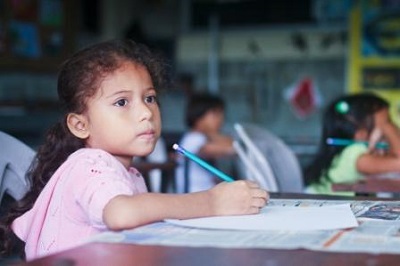While technology continues to proliferate throughout many parts of the world, there are still some hindered by geography. Islands, rural regions, and those in distant corners of countries have a harder time getting access to Internet services and necessary equipment. For schools, this can be especially challenging. But education advocates have discovered that some of these barriers can be overcome using a technology that has become essentially universal across the globe: text messaging.
Recently, an Australian-funded project found surprising success in lifting reading levels for school children in Papua New Guinea, using SMS services to communicate with teachers. The project worked with 26 schools, and reports that, by the end of the project’s duration, the SMS tactic had raised standards in four out of five reading skills among a group of 1,000 children. The fact that this can be accomplished with a simple series of regular text messages is pretty remarkable.
Here’s how the system worked: Every school day morning, teachers involved in the project would receive two text messages. The first text would be a short story, and the second would be a lesson plan offering some ideas about how to teach reading skills using that short story. Teachers were encouraged to write out the short story on a blackboard so that it could be read out loud to the students, word by word, introducing students to new sounds, letters and words. Then, teachers were given suggestions for further activities, such as having students read the story out loud to the class and to one another, play games, write related stories, and draw pictures to deepen students’ connection between the words and the ideas they conveyed.
Part of what made this project so successful was the use of SMS. In a radio interview, Dr. Amanda Watson, a mobile communications research consultant in Port Moresby and a member of the study, expanded on this point.

Image via De Visu / Shutterstock.com
“I think one of the beautiful things about this trial was that it was using very simple technology. The teachers already had mobile phones in their possession, they were already aware of how to send and receive text messages,” she said. “I think that's one of the great things about this trial—that it's not introducing additional technology, which requires security, which requires electricity as well, which is a big issue in many parts of Papua New Guinea. And, of course, SMS or text messaging can be done on any phone.”
Not only is text messaging available now and easy to use, but Watson believes that this type of educational outreach through SMS could become a regular and successful staple for teaching programs in Papua New Guinea and similar places. “I think, to be honest with you, for many years to come this could prove to be a very valuable way of getting resources out to teachers and possibly also to health workers and other workers throughout Papua New Guinea and indeed perhaps in other places in the Pacific, where it might be difficult to get books or other resources to those important workers,” she said.
Text messaging is a highly versatile technology that continues to bridge technological gaps, and provide new opportunities for people around the world.
Edited by Rory J. Thompson
 Internet Telephony Magazine
Click here to read latest issue
Internet Telephony Magazine
Click here to read latest issue CUSTOMER
CUSTOMER  Cloud Computing Magazine
Click here to read latest issue
Cloud Computing Magazine
Click here to read latest issue IoT EVOLUTION MAGAZINE
IoT EVOLUTION MAGAZINE




